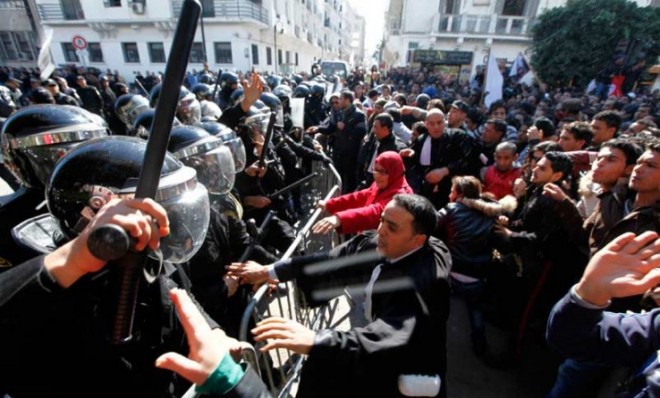Are the world's worst fears about Islamists coming true?
A liberal opposition leader in Tunisia is shot dead outside his home, endangering the country's fledgling democracy


A free daily email with the biggest news stories of the day – and the best features from TheWeek.com
You are now subscribed
Your newsletter sign-up was successful
On Wednesday, Chokri Belaid, a leading critic of the Islamist-led government in Tunisia, was shot dead outside his home in Tunis, roiling a young democracy that sparked the Arab Spring in 2011 with the ouster of longtime dictator Zine El-Abidine Ben Ali. Suspicion for the killing immediately fell on hardline Salafists who over the past year have waged a violent campaign against symbols of Tunisia's secular tradition: Movie theaters, art exhibits, liquor vendors, intellectuals, artists, journalists, and human rights activists.
Belaid, a prominent leader of the opposition Popular Front coalition, had heavily criticized the government for protecting the Salafists, who seek to impose their interpretation of Islamic law on Tunisia. Belaid had recently accused the Salafists of attacking a meeting of his supporters. Human rights activists say the government, led by the moderate Islamist Ennahada party, is unwilling to crack down on more extremist elements in Tunisia. According to Abigail Hauslohner at The Washington Post:
Complaints filed by the victims of alleged Salafist violence to Tunisia’s police force and judiciary, for example, rarely yield serious investigations and prosecutions, said Eric Goldstein, the deputy director of the Middle East and North Africa for Human Rights Watch.
"There is a climate of laxness toward violence in Tunisia," Goldstein said. "[The government's] response to these attacks by Salafi groups is that it’s better to have dialogue with them and bring them into the political process, rather than throw them in jail." [Washington Post]
For its part, Ennahda strongly condemned Belaid's killing, calling it a "heinous crime." President Moncef Marzouki cut short an official visit to France, and called on law enforcement authorities to prosecute those responsible. He described Belaid as a "longstanding friend," and also asked Tunisians to show "self restraint, and not to be hasty in analyzing this crime and cowardly act or to blame one side or another for it."
The Week
Escape your echo chamber. Get the facts behind the news, plus analysis from multiple perspectives.

Sign up for The Week's Free Newsletters
From our morning news briefing to a weekly Good News Newsletter, get the best of The Week delivered directly to your inbox.
From our morning news briefing to a weekly Good News Newsletter, get the best of The Week delivered directly to your inbox.
Despite that, Belaid's supporters gathered to protest his death in front of the interior ministry — a reviled symbol of state repression under Ben Ali's regime — and called for a "second revolution." The scene was remarkably similar to those that have played out in recent days in Egypt, where protesters, alienated by an Islamist majority, have linked the government with the oppression exercised by its predecessor. Egyptian President Mohamed Morsi has been accused by his secular critics of hijacking the revolution, and becoming an Islamist version of former dictator Hosni Mubarak.
Ennahda has not conducted the type of worrisome, power-grabbing moves that Morsi has made in recent months, though Ennahda has been under pressure to include more secular parties in its ruling coalition. Indeed, Tunisia was considered something of a model for how the Arab Spring could play out, with a moderate Islamist party in power that respects liberal democracy. That is why Belaid's killing is so troublesome and deflating for pro-democracy activists in the region, another sign that hardline Islamists, many of whom are fundamentally anti-democratic, will use any means necessary to derail progress. Belaid's killing has also renewed questions of whether Islamism and democracy can coexist in the region.
It's clear that the best way for Ennahda to show its commitment to secularism, democracy, and law and order is to bring Belaid's killers to justice and crack down on the Salafists. Anything less would be seen as a victory for the fundamentalists — and might help fulfill Belaid's prediction, before his death, that Tunisia would soon be awash in political violence.
A free daily email with the biggest news stories of the day – and the best features from TheWeek.com
Ryu Spaeth is deputy editor at TheWeek.com. Follow him on Twitter.
-
 The Olympic timekeepers keeping the Games on track
The Olympic timekeepers keeping the Games on trackUnder the Radar Swiss watchmaking giant Omega has been at the finish line of every Olympic Games for nearly 100 years
-
 Will increasing tensions with Iran boil over into war?
Will increasing tensions with Iran boil over into war?Today’s Big Question President Donald Trump has recently been threatening the country
-
 Corruption: The spy sheikh and the president
Corruption: The spy sheikh and the presidentFeature Trump is at the center of another scandal